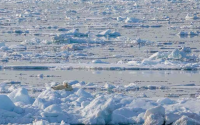6 January 2005Scoop Media
In an uncommon event, icebergs have been spotted in New Zealand waters.
Dr Lionel Carter, a principal scientist at NIWA, says the icebergs have been transported from Antarctica in the fast flowing Antarctic Circumpolar Current. "Clusters of icebergs have been seen in the deep ocean east of Campbell Island," says Dr Carter. Fifteen icebergs, some up to 3 km wide, were recorded in a single sighting just before Christmas.
The icebergs are a hazard to shipping, including fishing vessels and yachts participating in the Vendéeglobe race, where sailors are racing solo, non-stop around the world. The sightings, first made by the fishing vessel, Avro Chieftain, are being recorded by the Rescue Coordination Centre New Zealand. The Marine Safety Authority has issued navigation warnings for the area.
Dr Carter has provided advice to the Rescue Coordination Centre on how the icebergs got into the area. "The vast Campbell Plateau projects into the path of the eastward moving Antarctic Circumpolar Current forcing it and its iceberg cargo to about latitudes 55-51° South, before peeling off to continue its eastward journey. But occasionally, local winds and currents drive them further north," he says. The most northerly iceberg at the moment is at 51o South, which is just 240 km southwest of Antipodes Island.
Dr Carter says the icebergs may have been generated by large break-ups of the vast ice shelves in Ross Sea and Weddel Sea in recent years. "Clearly large quantities of ice were originally involved because the icebergs have survived a journey of several thousands of kilometers in relatively warm water (5 to 8°C)."
Icebergs have previously been reported in New Zealand waters in the 1890s, early 1920s, 1930s and in 1948. In 1892, icebergs extended as far north as Chatham Rise and in 1931 as far as the latitudes of Dunedin.
Dr Carter says it is too soon to blame this latest flotilla of ice on global warming. "Icebergs were seen in New Zealand waters well before significant warming of the climate. However, the coincidence of large collapses of the Antarctic ice shelves with a rapidly changing climate cannot be dismissed, which is why considerable effort is going into identifying the causes of ice shelf collapse and its downstream effects on global ocean and climate" Dr Carter says. "The presence of ice at our back door step highlights the close links between the New Zealand and Antarctic environments."






